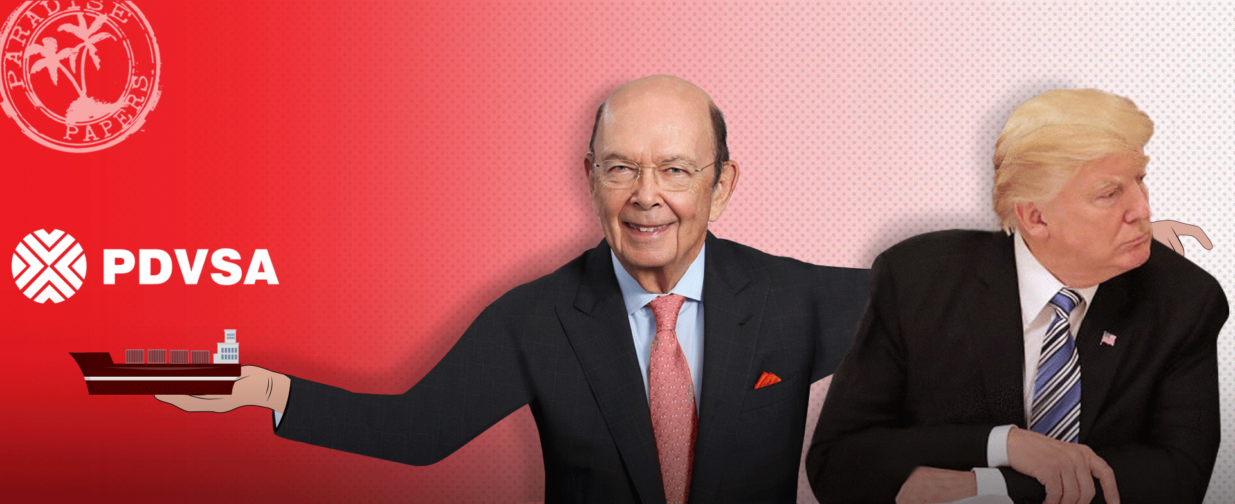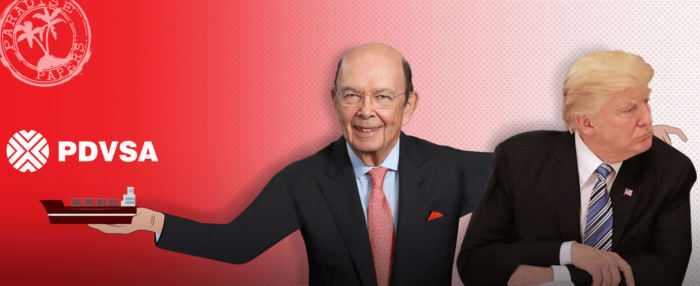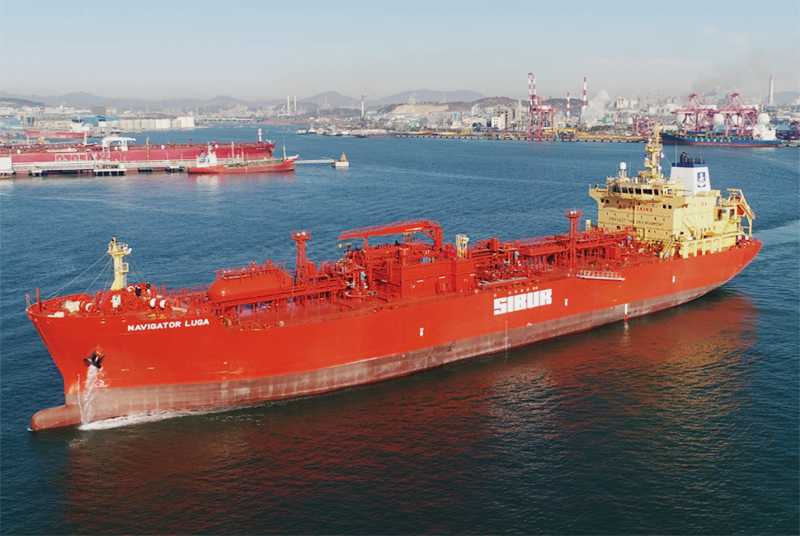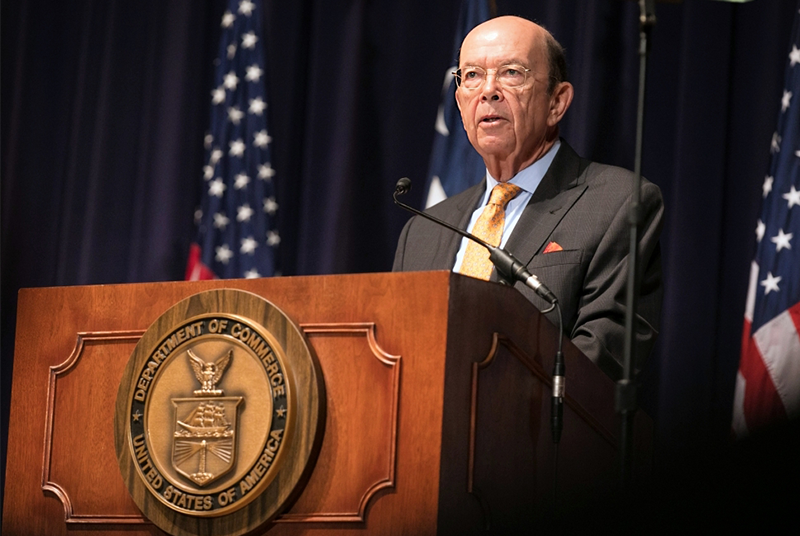

The member of the US Cabinet, Wilbur Ross, is one of the owners of a company that provides maritime transport services to Pdvsa, a client that in 2015 contributed over 11 percent of the profits to his shipping company. Although the official had to get rid of his mercantile properties to hold his position, he kept a participation in that line of business through a complex offshore structure in the Cayman Islands. Thus, he did not only do business with chavista Venezuela, but also with an associate of Russian President Vladimir Putin. Both countries are subject to economic sanctions by Washington.
|
Getting your Trinity Audio player ready...
|
Despite the recent sanctions imposed by the government of President Donald Trump on top officials of the Venezuelan regime, and having prohibited the financial sector transactions with Venezuelan State bonds, the US Secretary of Commerce (minister), Wilbur L. Ross Jr. has a stake in a shipping company that receives millions of dollars a year in profits for providing coastal trade service to the state oil company Petróleos de Venezuela (Pdvsa).
Ross, a millionaire private equity investor, sold most of his company's assets before joining President Donald Trump's cabinet in February, but held a stake in the shipping company Navigator Holdings Ltd., established in the Marshall Islands in the South Pacific. The offshore entities in which Ross and other investors hold a financial stake controlled 31.5% of the company in 2016.
According to the annual report of the company filed with the Securities and Exchange Commission (SEC), Pdvsa is not exactly a minor client of Navigator, as it contributed 10.7 percent of its revenue in the fiscal year of 2014, and another 11.7 percent in 2015. This is a net payment of 33.7 and 36.9 million dollars, respectively, which the company received after chartering three of its 29 tankers for the transport of liquefied petroleum gas (LPG) in those years.
Washington's ban on US banks from participating in any type of financing to the Venezuelan government, including Pdvsa, does not directly affect Navigator's business with Venezuela, as the sanctions still do not order the suspension of all types of commercial relationships with the self-styled Bolivarian Revolution. However, in its annual report, the company recognizes that "the geopolitical risks associated with chartering vessels to Indonesian and Venezuelan state corporations are significant and may have a negative impact on our business, our financial condition and operating results."
"If a contractual dispute arises, it would be difficult for us to assert our rights against Pdvsa"
These risks include the possibility of expropriation or nationalization of properties, the difficulties to defend their assets before the courts of the country and difficulties to maintain the level of profits due to elements like exchange control, strikes, sudden changes in laws, insurrections and even wars. " If a contractual dispute arises, it would be difficult for us to assert our rights against Pdvsa (...) We cannot predict how government policies can change now or in the future under the administration of Venezuela or Indonesia (...) We depend largely on third parties to offer technical service to our fleet."
Despite these warnings, until April of this year, Navigator offered shipping services to PDVSA with at least two of its tankers, Navigator Taurus and Navigator Virgo, which usually cover routes between Venezuela and the Caribbean islands.
If something distinguishes Ross's good head for business, it is precisely his inclination to risk, including politics, since another of Navigator's main clients, with a contribution of more than 68 million dollars in revenues since 2014, is the gas and petrochemical company Sibur, based in Moscow.
Two of its main owners are Kirill Shamalov, who is married to the youngest daughter of Russian President Vladimir Putin, and Gennady Timchenko, the sanctioned oligarch whose activities in the energy sector were "directly linked to Putin," according to the Department of the Treasury. Another powerful owner is Sibur's largest shareholder, Leonid Mikhelson, who controls an energy company that was also sanctioned by the Department of the Treasury for supporting Putin's government.
As Secretary of Commerce, Ross has direct authority over trade and manufacturing policies and is an influential voice in the government over virtually every aspect of the US economic relationship with other countries, including Russia. In recent years, tensions between the United States of America and Russia have intensified, and the USA has imposed sanctions against Russia after the invasion of Crimea in 2014 and its interference in the 2016 presidential election.
After the election, the investigations carried out by the US Congress and the Department of Justice have explored potential commercial relationships between Russia and the members of President Trump’s administration. Although several associates of business and the Trump campaign have been investigated, so far no business connections have been reported between senior Trump administration officials and members of Putin's family or his close circle.
During his confirmation process, Ross was repeatedly asked about his business dealings with Russia and his holdings in the shipping industry and whether they could pose a conflict of interest with his duties as Secretary of Commerce.
The same question was asked in a questionnaire sent by the International Consortium of Investigative Journalists (ICIJ), within the framework of the Paradise Papers project, answered by the spokesman of the Secretary of Commerce, James Rockas, as follows: "Secretary Ross personally dissociates from any issue focused on transoceanic cargo ships, but in general, he has supported the sanctions of the administration applied to Russian and Venezuelan entities. Secretary Ross has never had to seek or has received any ethical exemption and works closely with officials of the Department of Commerce to ensure the highest ethical standards."
"Why does any US government official have any relationship with a Putin buddy?"
Still, in the United States of America, Ross's relationship with Putin's intimate circle is questioned. Sibur is "a company with clientelist connections," said Daniel Fried, an expert in Russia who held senior positions in the Department of State in both Republican and Democratic administrations. "Why does any US government official have any relationship with a Putin buddy?"
The indirect commercial connection of the Secretary of Commerce with Putin's son-in-law and the oligarchic allies arises from a review of public records and a leak of millions of offshore financial documents from the law firm Appleby in Bermuda obtained by the Munich Süddeutsche Zeitung newspaper, in Germany, and shared with the International Consortium of Investigative Journalists and its global network of media partners. They show the inner working of Appleby from the 1950s to 2016. The files include documents from Appleby’s corporate services division, which became independent in 2016 under the name of Estera.
The leaked files show a chain of companies and associations in the Cayman Islands through which Ross has kept his financial stake in Navigator.
The fact that Ross’ companies in the Cayman Islands benefit from a company controlled by Putin’s intermediaries raises serious potential conflicts of interest, experts say. As Secretary of Commerce, Ross has the power to influence trade, sanctions and other US measures that could affect the owners of Sibur. Likewise, the owners of Sibur, and through them Putin himself, could have the ability to increase or decrease the business of Sibur with Navigator depending on Ross helping or not to guide the US policy.
From 2014 to 2015, the revenues of the shipping company from Sibur skyrocketed from 5.3% (16.2 million dollars) to 9.1% (28.7 million dollars) of total revenues, making the company one of the five best clients of Navigator, according to the filings with the US Securities and Exchange Commission, before falling to 7.9% (23.2 million dollars) in revenue last year. This year, Navigator doubled the fleet engaged in Sibur's exports by acquiring two new ships and chartering them to the Russian energy company. The ships were named Navigator Luga and Navigator Yauza, both names of Russian rivers.

Figures do not look the same when it comes to Pdvsa, a customer that contributed more profits for Navigator between 2014 and 2015 than Sibur, but since last year, it has suffered delays in the payment of all the services contracted and, therefore, it had to do without contracting one of the three tankers that chartered Ross's company.
Before joining Trump's cabinet, Ross, 79, was a titan in the world of private equity, and brought together investors from around the world to invest money in struggling companies, with the aim of making them profitable. When everything went well, he and his company not only earned money from their investments and management fees, but also from a compensation system that allows the general partners managing the private equity funds to earn 20% of all the profits exceeding a certain level.
Many of the private equity funds involved in these investments were created and managed by Appleby, the Bermuda-based offshore law firm. The leaked files offer a glimpse into how Appleby helped Ross’ company WL Ross & Co, LLC reap the benefits of offshore tax havens, like the Cayman Islands, a British territory that allows extraordinary levels of bank secrecy and lets shell companies operate there while ran from New York without tax charges. In 2015, the Cayman Islands ranked fifth in the global rankings of the Financial Secrecy Index.
General partners in an offshore private equity fund enjoy generous tax exemptions in the USA
Creating offshore funds organized as corporations can be really attractive for some investors, allowing them to create tax-exempt organizations in the United States of America —including huge pension funds and very rich universities— to bypass a rule the Internal Revenue Service that forces them to pay taxes on income earned with borrowed money. They also help attract non-US investors because their names are not disclosed to tax authorities in the USA.
General partners in an offshore private equity fund enjoy generous tax exemptions in the USA, including the ability to count the largest proportion of their income from the fund as long-term capital gains, rather than ordinary income. This allows the richest fund managers to reduce their taxes on that income from 39.6%, the maximum US tax rate, to 20%.
When he was appointed secretary of commerce, Ross submitted an agreement with the federal Office of Government Ethics that said that he intended to divest 80 companies and associations, but would maintain a share in nine others that had assets in "real estate financing and mortgage loan” and “the transoceanic shipment." The assets were not specified. Although he had sold WL Ross & Co. to Invesco in 2006, he remained active as president and CEO until he resigned to join the cabinet.

His financial disclosure report, also submitted to the Office of Government Ethics, has 57 pages and includes a long list under the heading "Employment Assets and Income and Retirement Accounts." This list is divided into sections that list assets that appear to be owned by each of Ross' companies, itemizing up to seven layers of entities between Ross and the assets he owns.
Buried in a large number of subsections, there are four cryptically named Cayman Islands entities that are among those he said to hold: WLR Recovery Associates IV DSS AIV, GP; WLR Recovery Associates IV DSS AIV, LP; WLR Recovery Associates V DSS AIV, GP and WLR Recovery Associates V DSS AIV, LP. The four companies are administered by the Appleby Law Firm. "Navigator Holdings" is among the assets held by these companies.
The complexity of the offshore structures adds legal distance and reputation and obscures the full scope of Ross's business relationships even when they allow him to take advantage of them, according to tax and ethics experts consulted by ICIJ.
Ross' disclosure values his current combined participation in offshore entities with Navigator shares of 2.05 to 10.1 million dollars. But it is not clear what his total holdings are because he did not list a value for one of the four entities he held. It is not obvious why or if a value was really omitted. His stake represents a fraction of the total stake of 31.5% of the entities in Navigator, which, based on the market price of the company as of October 30, 2017, is worth approximately 179 million dollars.
(*) This is the first issue in Armando.info of the Paradise Papers project. In this project, 13.4 million documents from two offshore service providers, Appleby (Bermuda) and Asiaciti Trust (Hong Kong), and business records of 19 tax havens, obtained by the German newspaper Süddeutsche Zeitung through a leak that it shared through the International Consortium of Investigative Journalists (ICIJ, Washington) were analyzed with 382 journalists from 96 media in 67 countries. In Venezuela, the project partner is Armando.info, which made an alliance for its publication with El Nacional newspaper of Caracas.
Since its opening in 2017, the Porsche Design Tower quickly became a symbol of luxury and ostentation in South Florida. Magnates from all over the world retreat behind the discretion of its tinted glass windows and virtually anonymous legal entities. But in recent days, two police investigations into illegal financial flows from abroad placed the building under an inconvenient spotlight. The justice just seized an apartment of over five million dollars from a Venezuelan agent.
As if they were pieces of a broken mirror scattered in many islands around the world, several offshore companies form an oil-trading business network that reveals the trajectory of Alessandro Bazzoni and Francisco D'Agostino. Both of them, together with the Venezuelan telecommunications magnate Oswaldo Cisneros, landed in 2016 in the Orinoco Belt to fill the vacancy of the original partner, Harvest Natural Resources.
Aside from ethical questions, the logic of a private entity opening an offshore company seems elementary —to declare its profits in a territory where it can pay less tax than it should in its place of origin. But when it comes to a state-owned company like Petróleos de Venezuela, which is not obliged to pay taxes - and therefore does not need to evade them - it is difficult to understand why within its business scheme there is contracting with companies established in tax havens and there is even the creation of their own subsidiaries in these places. What does the Venezuelan public treasury gain from this?
The name of the former head of the Venezuelan oil company in Colombia appears in the papers of Mossack Fonseca with 100% of the shares of a company created in June 2011, of which she requested to be dissolved six months later. She is unemployed since August 2015, when she was replaced by the ex-sister-in-law of President Nicolás Maduro
The former Vice President of Finance and director of the state oil company was one of the executives in the industry with more charges and accusations. In 2006, the Office of the Comptroller opened a proceeding against him for not filing the sworn statement of assets. In 2011, he became noticeable for his alleged participation in the Ponzi scheme of Francisco Illaramendi. In 2009, four years after having him as a client, Mossack Fonseca learned that he was a Politically Exposed Person, but maintained the business relationship because no "links to illegal activities" were found.
Until 2010, he was the auditor general of PDVSA. A year before retirement, he wanted to have a power of attorney to manage a company registered in Panama, through an operation that involved Switzerland and Luxembourg, all under a scheme designed by Mossack Fonseca, a Panamanian law firm specialized in creating international structures to cover the wealth of those who can pay for their services.
When Vice President Delcy Rodríguez turned to a group of Mexican friends and partners to lessen the new electricity emergency in Venezuela, she laid the foundation stone of a shortcut through which Chavismo and its commercial allies have dodged the sanctions imposed by Washington on PDVSA’s exports of crude oil. Since then, with Alex Saab, Joaquín Leal and Alessandro Bazzoni as key figures, the circuit has spread to some thirty countries to trade other Venezuelan commodities. This is part of the revelations of this joint investigative series between the newspaper El País and Armando.info, developed from a leak of thousands of documents.
Leaked documents on Libre Abordo and the rest of the shady network that Joaquín Leal managed from Mexico, with tentacles reaching 30 countries, ―aimed to trade PDVSA crude oil and other raw materials that the Caracas regime needed to place in international markets in spite of the sanctions― show that the businessman claimed to have the approval of the Mexican government and supplies from Segalmex, an official entity. Beyond this smoking gun, there is evidence that Leal had privileged access to the vice foreign minister for Latin America and the Caribbean, Maximiliano Reyes.
The business structure that Alex Saab had registered in Turkey—revealed in 2018 in an article by Armando.info—was merely a false start for his plans to export Venezuelan coal. Almost simultaneously, the Colombian merchant made contact with his Mexican counterpart, Joaquín Leal, to plot a network that would not only market crude oil from Venezuelan state oil company PDVSA, as part of a maneuver to bypass the sanctions imposed by Washington, but would also take charge of a scheme to export coal from the mines of Zulia, in western Venezuela. The dirty play allowed that thousands of tons, valued in millions of dollars, ended up in ports in Mexico and Central America.
As part of their business network based in Mexico, with one foot in Dubai, the two traders devised a way to replace the operation of the large international credit card franchises if they were to abandon the Venezuelan market because of Washington’s sanctions. The developed electronic payment system, “Paquete Alcance,” aimed to get hundreds of millions of dollars in remittances sent by expatriates and use them to finance purchases at CLAP stores.
Scions of different lineages of tycoons in Venezuela, Francisco D’Agostino and Eduardo Cisneros are non-blood relatives. They were also partners for a short time in Elemento Oil & Gas Ltd, a Malta-based company, over which the young Cisneros eventually took full ownership. Elemento was a protagonist in the secret network of Venezuelan crude oil marketing that Joaquín Leal activated from Mexico. However, when it came to imposing sanctions, Washington penalized D’Agostino only… Why?
Through a company registered in Mexico – Consorcio Panamericano de Exportación – with no known trajectory or experience, Joaquín Leal made a daring proposal to the Venezuelan Guyana Corporation to “reactivate” the aluminum industry, paralyzed after March 2019 blackout. The business proposed to pay the power supply of state-owned companies in exchange for payment-in-kind with the metal.